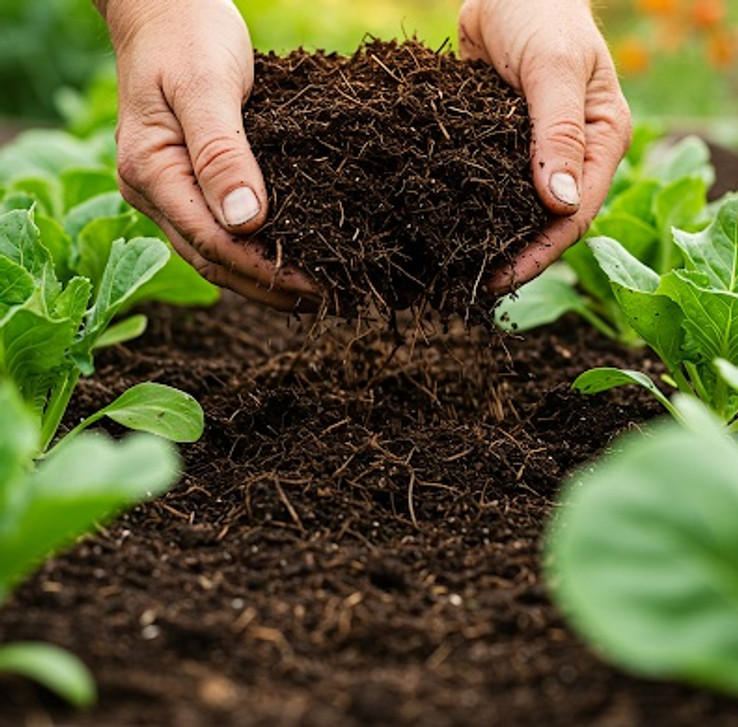In the world of organic gardening, soil health reigns supreme. It is the foundation upon which thriving plants and bountiful harvests are built. Organic gardeners understand that nurturing the soil is key, and that means choosing fertilizers that work with nature, not against it. While synthetic fertilizers offer a quick fix, they often come with hidden costs, disrupting the delicate soil ecosystem and potentially introducing harmful chemicals. That is where alternative fertilizers step in, offering a sustainable and eco-friendly path to soil fertility and plant health.
This expanded guide delves deeper into the world of alternative fertilizers, exploring their unique benefits and providing practical tips for incorporating them into your organic garden.
- Compost: The Cornerstone of Organic Gardening
Compost is a dynamic and transformative force in the garden, working tirelessly to improve soil structure, water retention, and nutrient availability. This organic goldmine, born from kitchen scraps, fallen leaves, and other plant debris, is a testament to nature's recycling prowess.
- Improved Soil Structure: Compost enhances soil texture, creating a well-aerated and porous environment that promotes healthy root growth. As organic matter decomposes, it creates spaces within the soil, allowing air and water to circulate freely. This improved aeration benefits plant roots by providing them with the oxygen they need to thrive.
- Boosted Water Retention: Compost acts like a sponge, absorbing and holding onto water. This increased water retention capacity is especially beneficial during dry periods, as it helps plants maintain adequate moisture levels. By reducing the frequency of watering, compost also helps conserve water, making it an environmentally friendly choice.
- Nutrient Powerhouse: Compost is a slow-release nutrient powerhouse, providing a steady supply of essential elements like nitrogen, phosphorus, and potassium. As microorganisms break down the organic matter, they release these nutrients in a form that plants can readily absorb. This gradual release ensures that plants receive a continuous supply of nutrients throughout the growing season, promoting healthy growth and development.
- Living Soil: Compost is teeming with beneficial microorganisms, such as bacteria and fungi, which create a vibrant and dynamic soil ecosystem. These microorganisms help break down organic matter, improve soil structure, and make nutrients more available to plants. They also play a crucial role in protecting plants from diseases and pests.
By incorporating compost into your garden, you are not just adding nutrients; you are creating a living, breathing soil ecosystem that supports healthy plant growth and overall garden productivity.
- Manure: A Time-Tested Soil Enricher
Manure, a classic soil amendment, has been used for centuries to boost soil fertility. Derived from animal waste, it provides a rich source of organic matter, essential nutrients, and beneficial microorganisms. However, it is crucial to choose the right type and apply it correctly to avoid potential problems.
Choosing the Right Manure:
- Herbivore Manure: Opt for well-rotted manure from herbivores like cows, horses, sheep, or chickens. These manures are generally safe for use in the garden and provide a balanced mix of nutrients.
- Avoid Carnivore Manure: Refrain from using manure from carnivores like cats or dogs, as it may contain harmful pathogens.
Composting is Key:
- Hot Manure: Fresh manure can be too "hot" for plants, potentially burning roots or introducing harmful pathogens. Always compost manure thoroughly before using it in your garden. The composting process breaks down the organic matter, kills pathogens, and creates a nutrient-rich, stable product.
Practical Tips for Using Manure:
- Incorporating Manure into the Soil: Aged manure can be incorporated into the soil before planting or used as a side-dressing for established plants.
- Top Dressing: Apply a thin layer of aged manure as a top dressing around plants, taking care not to pile it up against the stems.
- Manure Tea: Create a diluted manure tea by soaking aged manure in water for a few days. This liquid fertilizer can be applied to plants as a foliar spray or watered into the soil.
By following these guidelines, you can safely and effectively use manure to enrich your garden soil and promote healthy plant growth.
- Fish Emulsion: A Liquid Boost of Nutrients
Fish emulsion, derived from fish processing byproducts, is a potent liquid fertilizer that offers a quick and readily available source of nutrients for your plants. It is a popular choice among organic gardeners due to its numerous benefits:
- Nutrient-Rich: Packed with nitrogen, phosphorus, and potassium, fish emulsion provides a balanced nutritional boost for your plants. These essential nutrients are readily available for uptake, promoting healthy growth and development.
- Rapid Absorption: Plants can quickly absorb the nutrients in fish emulsion, making it ideal for addressing deficiencies or giving plants a quick pick-me-up. When applied as a foliar spray, the nutrients are directly absorbed through the leaves, bypassing the soil and providing immediate results.
- Beneficial Microorganisms: Fish emulsion contains beneficial microorganisms that colonize the root zone, improving soil health and nutrient availability. These microorganisms help break down organic matter, making nutrients more accessible to plants.
- Enhanced Plant Health: In addition to providing essential nutrients, fish emulsion can also help improve plant health and resilience. It can strengthen plant cell walls, enhance disease resistance, and improve overall plant vigor.
Practical Tips for Using Fish Emulsion:
- Dilution: Always dilute fish emulsion according to the manufacturer's instructions. Over-application can damage plants.
- Application Methods: Fish emulsion can be applied as a foliar spray or watered into the soil. For foliar applications, apply in the early morning or evening to avoid scorching the leaves. For soil applications, water it thoroughly to ensure the nutrients reach the root zone.
- Odor: Fish emulsion can have a strong odor. Consider applying it in the early morning or evening when the air is cooler to minimize the smell.
- Combination with Other Fertilizers: Fish emulsion can be combined with other organic fertilizers, such as compost tea or seaweed extract, to create a synergistic blend that provides a comprehensive range of nutrients and benefits for your plants.
- Bone Meal: A Slow and Steady Source of Phosphorus
Bone meal, a natural and organic fertilizer derived from ground animal bones, is a valuable source of phosphorus, a crucial nutrient for plant growth and development. Phosphorus plays a vital role in various plant processes, including:
- Root Development: Phosphorus helps strengthen root systems, enabling plants to absorb water and nutrients more efficiently. Strong roots provide a stable foundation for plants, making them more resistant to stress and disease.
- Flowering and Fruiting: Phosphorus is essential for the formation of flowers and fruits. It helps in the development of pollen, which is necessary for fertilization, and promotes the setting of fruits and seeds.
- Energy Transfer: Phosphorus plays a key role in the transfer of energy within plant cells. It is involved in photosynthesis, the process by which plants convert sunlight into energy.
Bone meal is a slow-release fertilizer, meaning it releases phosphorus gradually over time. This slow release ensures a steady supply of phosphorus to plants throughout the growing season, promoting healthy growth and development without the risk of nutrient burn.
Practical Tips for Using Bone Meal:
- Incorporate Before Planting: Work bone meal into the soil before planting, especially for root crops and flowering plants like bulbs and roses. This allows the phosphorus to be readily available to the roots as they grow.
- Side Dressing: You can also apply bone meal as a side dressing to established plants. Simply sprinkle it around the base of the plant and lightly work it into the soil.
- Combination with Other Fertilizers: Bone meal can be combined with other organic fertilizers, such as compost or manure, to create a balanced nutrient blend.
By using bone meal as part of your organic fertilization strategy, you can help your plants develop strong root systems, produce abundant flowers and fruits, and thrive in your garden.
- Seaweed and Kelp: Gifts from the Ocean
Seaweed and kelp extracts offer a treasure trove of benefits for your garden. These marine-based fertilizers are rich in essential minerals, trace elements, and natural growth hormones that stimulate plant development and enhance stress tolerance. They also improve soil structure and encourage beneficial microbial activity.
Seaweed and kelp fertilizers can be applied as a foliar spray or incorporated into the soil. They are particularly beneficial for boosting plant health, promoting vigorous growth, and enhancing overall plant performance.
- Green Manure: Cover Crops for Soil Enrichment
Green manures are a fantastic way to improve soil health and fertility naturally. This technique involves growing specific cover crops, such as:
- Legumes: Clover, vetch, and alfalfa are legumes that fix nitrogen from the atmosphere, adding it to the soil.
- Grasses: Rye, oats, and barley help improve soil structure and prevent erosion.
Practical Tip: Plant cover crops in the fall or spring and then till them into the soil a few weeks before planting your main crops.
Conclusion: Gardening in Harmony with Nature
By embracing alternative fertilizers, we can cultivate thriving gardens while minimizing our environmental impact. These natural soil amendments nourish our plants, support biodiversity, and promote the long-term health of our soil. Let us choose to garden in partnership with nature, creating a sustainable and abundant future for ourselves and generations to come.
Here is a summary of the key points:
- Importance of Soil Health: Organic gardening emphasizes building healthy soil naturally.
- Alternative Fertilizers: Instead of synthetic options, the article explored:
- Compost: Called "black gold," it improves soil structure, water retention, and provides balanced nutrients and beneficial microbes.
- Manure: A traditional source of nutrients but needs to be well-rotted or composted (especially from herbivores) to avoid harming plants or introducing pathogens.
- Fish Emulsion: A liquid fertilizer rich in N-P-K and trace elements, offering rapid nutrient absorption.
- Bone Meal: A slow-release source of phosphorus, excellent for root development and flowering.

